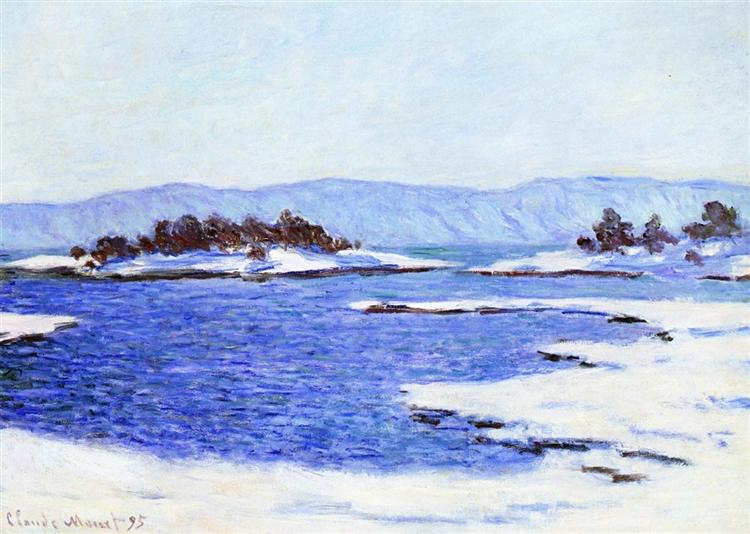Opis
Claude Monet's "The Shores of the Fjord at Christiania", painted in 1895, is an excellent testament to the artist's impressionistic style and his continued exploration of light and color in the natural landscape. The painting features a coastal landscape evoking the calm and serenity of a Nordic setting, most likely Norway, where Monet was staying during his trip to Scandinavia. In this piece, Monet's mastery in capturing the variations of light on the water and its interaction with the atmosphere is palpable, transporting the viewer to a deeply lived moment in time.
The composition is dominated by the water of the fjord, which takes up much of the canvas, flowing gently towards the horizon. Monet uses a palette that resembles that of his more advanced works, but one can also observe a particularly different approach to the use of colour. The blue and green tones of the water contrast with the greys and browns of the shore, while the sky, painted in various shades of blue, reflects the approach of a mostly clear day. The way Monet applies the paint, almost in brush strokes, gives it a quality that suggests both the movement of the water and the variations in light at different times of day.
In the foreground, the shore is dotted with moments of activity, with the loose brushwork Monet employs to suggest vegetation and rocks, conveying a sense of immediacy. While the work does not feature human figures in the prominent foreground, the hints of human existence are subtle. In the distance, a small boat glides gently across the water, emphasizing the tranquility of the landscape and man’s relationship to the natural environment. This choice not to overpopulate the painting with figures allows the landscape and the experience of nature itself to be the true protagonists of the work.
It is remarkable to note how the work reflects Monet's interest in the notions of ephemeral light, one of the defining characteristics of Impressionism. His technique of capturing luminosity and atmosphere can be seen in the way the sun's rays reflect off the water, creating a delicate play of light and shadow. Each brushstroke is a response to the atmospheric conditions of the moment and presents a view of the world that is both intangible and tangible, capturing the essence of nature in an image.
Monet was also known for his ability to transform the everyday into something beautiful through his art, and The Shores of the Fjord at Christiania is no exception. Every element of the painting, though seemingly ordinary, takes on a new life under the optics of his impressionistic brushstrokes. This work aligns with other pieces in his series of waterscapes, where the focus is on light and how it altered the perception of the environment, such as in Impression, Sunrise (1872) or in his Water Lilies series.
Monet's trip to Norway was relatively short, but it left a mark on his work. When viewing The Shores of the Fjord at Christiania, one can understand how the Nordic environment enriched his repertoire and his way of observing the natural world. This painting not only celebrates the beauty of the Scandinavian landscape, but also reflects the essence of Impressionism: the search for fleeting light and the transformation of visual perception into an evocative instant. Thus, Monet succeeds, with this work, in deeply connecting the viewer with the lived experience of nature in all its richness and diversity.
KUADROS ©, a famous painting on your wall.
Hand-made oil painting reproductions, with the quality of professional artists and the distinctive seal of KUADROS ©.
Painting reproduction service with satisfaction guarantee. If you are not completely satisfied with the replica of your painting, we will refund 100% of your money.

